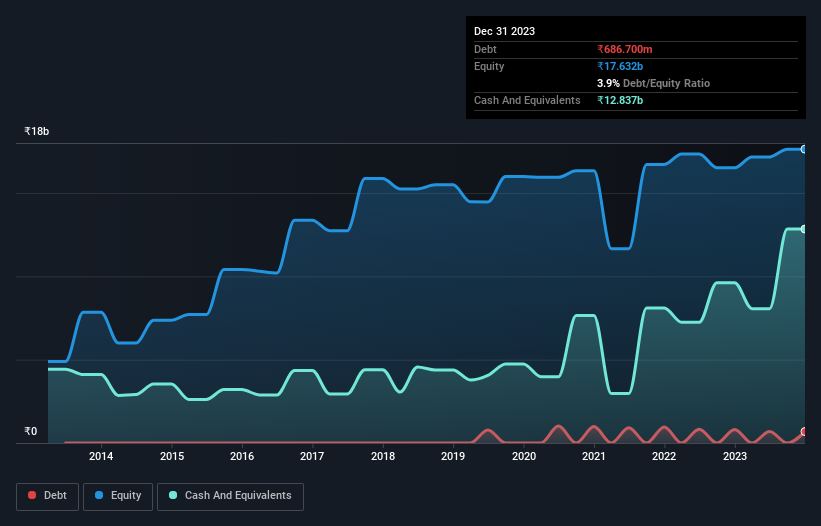- India
- /
- Personal Products
- /
- NSEI:COLPAL
Colgate-Palmolive (India) (NSE:COLPAL) Seems To Use Debt Rather Sparingly

Warren Buffett famously said, 'Volatility is far from synonymous with risk.' When we think about how risky a company is, we always like to look at its use of debt, since debt overload can lead to ruin. We can see that Colgate-Palmolive (India) Limited (NSE:COLPAL) does use debt in its business. But the more important question is: how much risk is that debt creating?
What Risk Does Debt Bring?
Debt is a tool to help businesses grow, but if a business is incapable of paying off its lenders, then it exists at their mercy. If things get really bad, the lenders can take control of the business. However, a more usual (but still expensive) situation is where a company must dilute shareholders at a cheap share price simply to get debt under control. Of course, plenty of companies use debt to fund growth, without any negative consequences. The first step when considering a company's debt levels is to consider its cash and debt together.
See our latest analysis for Colgate-Palmolive (India)
What Is Colgate-Palmolive (India)'s Net Debt?
As you can see below, Colgate-Palmolive (India) had ₹686.7m of debt at September 2023, down from ₹816.9m a year prior. However, it does have ₹12.8b in cash offsetting this, leading to net cash of ₹12.2b.

A Look At Colgate-Palmolive (India)'s Liabilities
The latest balance sheet data shows that Colgate-Palmolive (India) had liabilities of ₹12.7b due within a year, and liabilities of ₹778.6m falling due after that. Offsetting these obligations, it had cash of ₹12.8b as well as receivables valued at ₹1.60b due within 12 months. So it can boast ₹988.9m more liquid assets than total liabilities.
Having regard to Colgate-Palmolive (India)'s size, it seems that its liquid assets are well balanced with its total liabilities. So while it's hard to imagine that the ₹736.6b company is struggling for cash, we still think it's worth monitoring its balance sheet. Simply put, the fact that Colgate-Palmolive (India) has more cash than debt is arguably a good indication that it can manage its debt safely.
Another good sign is that Colgate-Palmolive (India) has been able to increase its EBIT by 22% in twelve months, making it easier to pay down debt. There's no doubt that we learn most about debt from the balance sheet. But it is future earnings, more than anything, that will determine Colgate-Palmolive (India)'s ability to maintain a healthy balance sheet going forward. So if you're focused on the future you can check out this free report showing analyst profit forecasts.
Finally, a business needs free cash flow to pay off debt; accounting profits just don't cut it. Colgate-Palmolive (India) may have net cash on the balance sheet, but it is still interesting to look at how well the business converts its earnings before interest and tax (EBIT) to free cash flow, because that will influence both its need for, and its capacity to manage debt. During the last three years, Colgate-Palmolive (India) generated free cash flow amounting to a very robust 85% of its EBIT, more than we'd expect. That positions it well to pay down debt if desirable to do so.
Summing Up
While it is always sensible to investigate a company's debt, in this case Colgate-Palmolive (India) has ₹12.2b in net cash and a decent-looking balance sheet. The cherry on top was that in converted 85% of that EBIT to free cash flow, bringing in ₹13b. So is Colgate-Palmolive (India)'s debt a risk? It doesn't seem so to us. The balance sheet is clearly the area to focus on when you are analysing debt. But ultimately, every company can contain risks that exist outside of the balance sheet. We've identified 1 warning sign with Colgate-Palmolive (India) , and understanding them should be part of your investment process.
Of course, if you're the type of investor who prefers buying stocks without the burden of debt, then don't hesitate to discover our exclusive list of net cash growth stocks, today.
New: AI Stock Screener & Alerts
Our new AI Stock Screener scans the market every day to uncover opportunities.
• Dividend Powerhouses (3%+ Yield)
• Undervalued Small Caps with Insider Buying
• High growth Tech and AI Companies
Or build your own from over 50 metrics.
Have feedback on this article? Concerned about the content? Get in touch with us directly. Alternatively, email editorial-team (at) simplywallst.com.
This article by Simply Wall St is general in nature. We provide commentary based on historical data and analyst forecasts only using an unbiased methodology and our articles are not intended to be financial advice. It does not constitute a recommendation to buy or sell any stock, and does not take account of your objectives, or your financial situation. We aim to bring you long-term focused analysis driven by fundamental data. Note that our analysis may not factor in the latest price-sensitive company announcements or qualitative material. Simply Wall St has no position in any stocks mentioned.
About NSEI:COLPAL
Colgate-Palmolive (India)
Manufactures and trades in personal and oral care products in India.
Flawless balance sheet with solid track record.
Market Insights
Community Narratives



